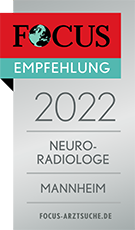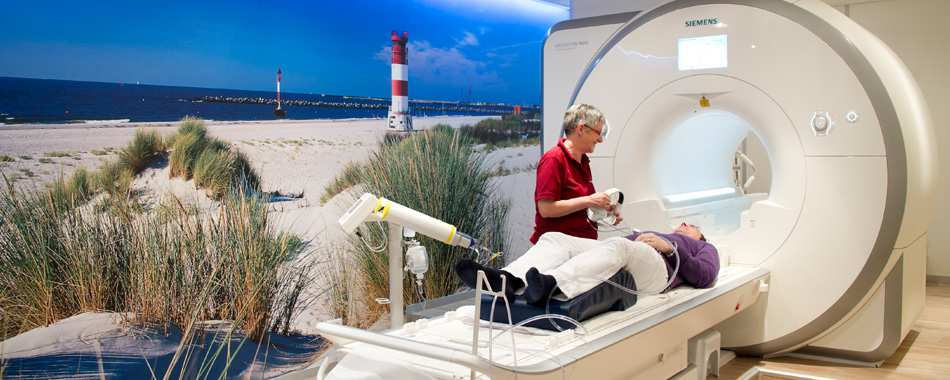Process of MRI examination
Before the examination
Before the beginning of the examination, you should remove all metal objects. These also include watches, hearing aids, check and credit cards. As a rule, metal objects inside the body, e.g. firm dentures, joint prostheses or metal plates after bone fracture repair, do not cause any problem.
Please indicate, whether you have any metal-containing items, especially
- vessel support, such as stents
- vessel clips
- artificial heart valve
- insulin pump
- metal splitter
- tattoos
Due to the fact that a magnetic field can cause dysfunctions, patients with cardiac pacemakers are excluded from the examination, as well as patients having internal ear prostheses (cochlear implants).
During the examination
During the examination you are lying on a table that is at first slowly moving into the opening of the scanner, i.e. in the direction of the magnet. You will be then completely or - with an examination of the knee joint - partially placed inside the scanner.
Magnetic fields that are being switched on and off produce relatively loud, knocking noises, which some patients can find annoying. For that reason, you will be given earplugs or headphones to wear; you can often hear (your own) music during the examination. Depending on the region of the body to be examined and the problem, the examination may take from a couple of minutes up to half an hour.
Administration of contrast media
During the examination in the MRI scanner it can be necessary to inject a special contrast medium. The injection is made into the body vein. The access will be correspondingly established after the examination.
As a rule, the administration of a contrast medium is harmless. Due to the fact that the contrast agent will be excreted through the kidneys, before the beginning of the examination we will require the current creatinine level from all kidney patients and all those who have been suffering from diabetes mellitus or high blood pressure over a long period of time. Patients with liver and kidney transplants are excluded from the administration of a contrast agent.
If the scanner seems to be too narrow
In general, you can assume that during the examination of the lower half of the body the head will be outside the device. In rare cases, short-acting sedation may be required. In this case, you should come to the examination accompanied by someone else, due to the fact that you will not be allowed to drive a car during a whole day after the examination.
Some patients suffer from the relative narrowness of the scanner (claustrophobia). If that is the case, you should discuss it with your family doctor or radiologist in advance.
You should not worry at all about it, for us it is daily routine. In case of doubt, you should try lying down in the scanner as a kind of experiment. If you are still anxious, we can give you a relaxation medium.


